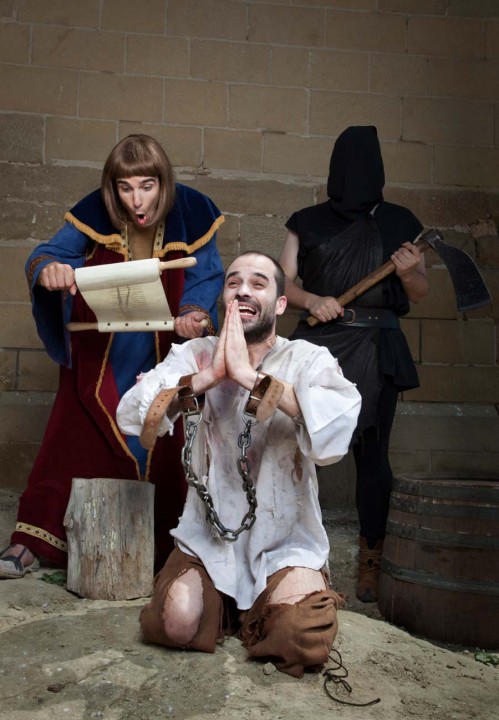The views expressed in our content reflect individual perspectives and do not represent the authoritative views of the Baha'i Faith.
How many of you stopped showering after seeing the movie Psycho? Did Jaws keep you from swimming in the ocean? After watching the Harry Potter films, do you look at the possibilities of a broom a little differently?
These were just stories—but you experienced them in a very real way. When an actor commented on the influence theater has on the audience, Abdu’l-Baha said:
“The drama is of the utmost importance. It has been a great educational power in the past; it will be so again.” He described how as a young boy he witnessed the Mystery Play of ‘Alí’s Betrayal and Passion, and how it affected him so deeply that he wept and could not sleep for many nights. – Abdu’l-Baha in London, p. 93.
 After performing Ann Boyles’ When the Moment Comes during the 1992 Baha’i World Congress held in New York City, the cast and crew reprised it in several other cities. The powerful play, based on the plight of Baha’is incarcerated in Evin Prison following the Islamic Revolution in Iran, explores their ability to maintain their faith during and after enduring physical and mental torture.
After performing Ann Boyles’ When the Moment Comes during the 1992 Baha’i World Congress held in New York City, the cast and crew reprised it in several other cities. The powerful play, based on the plight of Baha’is incarcerated in Evin Prison following the Islamic Revolution in Iran, explores their ability to maintain their faith during and after enduring physical and mental torture.
Following a Los Angeles performance, a reporter from Voice of America came backstage to interview the cast. In order to look like they’d been beaten with the bastinado, my feet were covered in a mixture of eye makeup and lipstick, creating an impression of dried blood and raw skin. After watching me act as if hobbling in pain during the play, the horror of it stayed with him. Even though he realized it was only cosmetics, he couldn’t go on with the interview until I covered my feet.
After attending this play, and other performances on Baha’i history, many people told me that they now had a fuller understanding of, and finally felt a true connection with, their religious forebears. The dramatization of those historical events made them real, no longer just a story or list of facts.
When you watch a play, you step out of the present to fully experience what happens onstage. For some it seems as if they themselves become an integral part of the story. The great poet Coleridge, in his Biographia Literaria, famously explained this phenomena as: “…that willing suspension of disbelief for the moment, which constitutes poetic faith…”
The immediacy of theater, along with our willing suspension of disbelief, can inspire us to plumb the recesses of our minds and souls and give due consideration to new ideas and opinions:
I like the fact that the theater always exists in the present tense, and that at its best it is an argument against the status quo. A serious play always holds a mirror up to people and says, “Look, this is who you are. This is how you behave. If you don’t like it, why don’t you change?” – Edward Albee, Excerpt from a speech at the National Press Club luncheon, November 29, 1995
The stage is a magic circle where only the most real things happen, a neutral territory outside the jurisdiction of Fate where stars may be crossed with impunity. A truer and more real place does not exist in all the universe. – P.S. Baber
The moral imperatives in film and theater range from our personal interactions with those closest to us to situations with world-wide impacts. Drama has the ability to convey our deepest emotions, from ecstatic pleasure to terrible pain, and in the process to teach us what it means to be human.
As an actor, I’ve been blessed to work in a number of productions that I believe equally stirred the emotions and uplifted the spirit. Recently I had the privilege of portraying Etta Bunch, a bigger-than-life Macy’s toy department saleslady with an even bigger heart. Etta plays matchmaker with Doris and Fred, the two leading characters in Miracle!, a musical adaptation of the beloved Valentine Davies’ film, Miracle on 34th Street.
Director Stacey Seaman feels Etta’s advice to Doris who feels lost and is searching for answers, is one of the most important parts of the story that she wants the audience to take home with them. Etta tells Doris, in her convoluted yet profound way, that
…answers aren’t nearly as important as questions. Answers can close doors that gotta be left open. But you’ve gotta ask yourself the right questions. Being afraid is never an answer. Afraid is… like a place to hide, and hiding’s a waste of time and energy. – Frank McGuire, Miracle!
Only prayer, I’ve learned, can keep those spiritual doors open. The actual imprisoned Iranian women in When the Moment Comes got through their ordeals with prayer, by beseeching Baha’u’llah’s aid:
I don’t know how we survived it. Physical strength, endurance—these weren’t enough. The pain was too intense. When that is happening to you, you think, ‘I can’t bear this. This is too much, Baha’u’llah. Why me? I can’t stand it anymore!’ and you can’t bear the pain by yourself. Somewhere in the middle of all of it you realize that. And you know that you have a simple choice to make. The guards, they want you to deny your faith. That is the only reason they are doing this to you. And if you deny your faith, the pain will stop. But, then you realize that your faith is your life and you are not going to give it up…. So you can’t bear the pain anymore, and you’re not willing to do the thing that will stop the pain. Really, then, there’s only one way you can deal with what’s happening to you. You begin to pray. You turn your thoughts away from your body, away from the pain, to Baha’u’llah. And, as you pray, something very strange happens. Somehow, you enter a place where there is no pain. Oh, your body is there on the bed, enduring it—but your spirit isn’t in that body. It’s somewhere else. It’s hard to explain. But, back in the cell, we would speak about it, and all of us had that out-of-body experience as we prayed during flogging. – Ann Boyles, When the Moment Comes.
Those who saw this play, or any others that depict characters who overcome their earthly tribulations through firm faith and sincere prayer for assistance, can call to mind the action(s) and words from the drama and use the memories as reminders that we, too, are capable of moving through our troubles when we supplicate God and trust in His guidance.
You May Also Like
Comments

















Ladjamaya